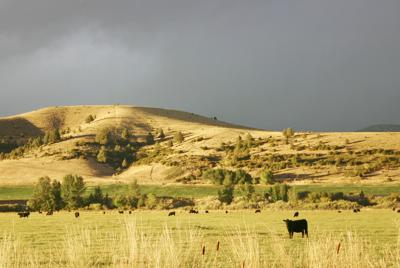Herein lies one of the issues with the BLM and their wasting of Taxpayer Dollars on Welfare Ranchers. Perhaps one of these Days, the Large NGOs involved in the lawsuit will wake up to the fact that we have research they can not use on their Own and Join Us when they are Invited. Sadly we do not have their funding yet but working towards creating the necessary income stream. Please Note The One Orgs name that does Join Us has been removed from the listed names in the Article below. The 2 listed have not once responded to an Invitation.
Closing ALL Grazing Allotments is long overdue, not only due to the costs to the taxpayer, but also the loss of natural grasses for our wildlife when the livestock import noxious weeds to take over.
The U.S. Bureau of Land Management is defending its renewal of grazing permits for two Oregon ranchers who received a presidential pardon after they were convicted of arson.
In 2018, President Donald Trump issued full pardons for Dwight and Steven Hammond, a father and son who raise cattle near Diamond and who’d been found guilty of setting fire to rangeland.
After former Interior Secretary Ryan Zinke renewed their authorization to graze on public allotments earlier this year, several environmental groups filed a lawsuit challenging the decision and convinced a federal judge to restrict where the Hammonds’ cattle can be released and how much forage they can consume.
The BLM is now arguing against a motion by the environmental plaintiffs to revoke the Hammonds’ grazing permits, claiming that Zinke properly considered the pardons in deciding to renew the ranchers’ grazing authorization.
“The secretary did have the authority to make the decision he did,” said Luther Hajek, an attorney representing the government, during Dec. 19 oral arguments in Portland.
For Zinke, the pardons were relevant when examining the ranchers’ “record of performance” in regarding to maintaining rangeland health, including the seriousness of past non-compliance with the government’s standards, according to BLM.
The grazing decision was consistent with BLM’s regulations and did not violate the Federal Land Policy and Management Act, nor did the lack of a full environmental analysis run afoul of the National Environmental Policy Act, according to the government.
The BLM appropriately used a “categorical exclusion” to exempt the grazing permit renewals from such an assessment because it’s within the Interior secretary’s discretion whether it’s necessary based on the decision’s environmental significance, the agency said.
Even if the judge does determine the grazing permit renewals violated a federal law, he should send the decision back to the BLM for reconsideration while allowing grazing to continue at current levels, according to BLM.
Not revoking the grazing permits would reduce fire risk by keeping fuels in check, Hajek said. “If grazing is managed properly, it’s healthy for the landscape.”
Any legal errors committed in the case weren’t serious, while the reduced grazing level currently in place is sufficient to allay the plaintiffs’ environmental concerns about impacts on the sage grouse and redband trout, he said.
“It’s not necessary to vacate the permit to maintain those environmental conditions,” Hajek said.
The environmental plaintiffs — —————- Center for Biological Diversity and Wildearth Guardians — argue the grazing permit renewals were unlawful because the Hammonds don’t meet the requirement for a “satisfactory record of performance.”
“Livestock grazing on public lands is a privilege, not a right,” said David Becker, attorney for the environmental groups. “Like any privilege, it’s subject to revocation if it’s abused.”
The presidential pardons don’t change the ranchers’ past actions that caused their request for grazing re-authorization to be denied in 2014, the groups argue. The BLM should also have evaluated the decision’s impacts on the sage grouse, rangeland health, invasive weeds and fire risks, the plaintiffs claim.
Just because President Trump pardoned the Hammonds does not indicate he thought their crimes weren’t serious, Becker said. “There is nothing on the face of either pardon about what the president’s intent was.”
The decision to renew the Hammonds’ grazing rights was “egregious” because Zinke “invented a rationale out of thin air,” which justifies overturning it, Becker said,
It’s possible for the BLM to take into account that the Hammonds have paid their debt to society, but the renewal decision should follow the proper regulations and environmental assessment, he said.
“The secretary and the BLM completely cut the public out of the management process for this allotment,” Becker said, adding that dangerous environmental effects from revoking the decision were unlikely.
“There’s no showing of highly disruptive consequences,” he said.
At the conclusion of the hearing, U.S. District Judge Michael Simon said he expected to reach a decision in the case the following day, Dec. 20.
A jury convicted the Hammonds of arson in 2012, with Dwight Hammond receiving a three-month prison sentence for igniting a fire in 2001 that consumed about 140 acres of federal property. His son, Steven Hammond, was sentenced to a year behind bars for that blaze as well as another fire that spread onto an acre of public land.
However, the ranchers were sent back to prison in 2016 after the 9th U.S. Circuit Court of Appeals ruled that they must both complete the federal mandatory minimum sentence of five years for arson.
A protest against their re-imprisonment precipitated an armed standoff at the Malheur National Wildlife Refuge.
Source: BLM argues against revoking Hammonds’ grazing permits | News | bluemountaineagle.com
